This is the second installment of a three-part series on how Saint Mary-of-the-Woods College has been able to pivot to the opportunities presented during the transitions of both learning and working in these pandemic times.
Part 2 – Our Faculty Are All In
By Karen Dyer, vice president for advancement and strategic initiatives
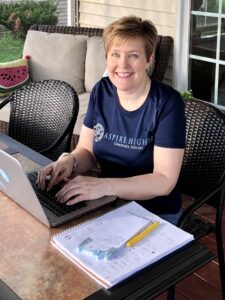
With nearly three-fourths of all courses formatted for online delivery, around 90% of faculty were prepared to adapt their traditional campus classes to serve students during the COVID-19 pandemic crisis according to Janet Clark, Ph.D., vice president for academic affairs and student life at Saint Mary-of-the-Woods College (SMWC).
“Woods faculty stand on a solid foundation of online teaching, one that began in 1973 with the launch of the then Women’s External Degree Program (WED), now Woods Online,” Clark stated.
“I am proud of our faculty in their response to moving courses mid-semester,” said Clark. “They have been very adaptable and shown so much initiative, with no push-back or dragging of feet.”
Dottie King, Ph.D., president, said SMWC, a college founded in mission, persistence and sacrifice which created a robust remote-learning program, could not be better poised to serve the needs of today’s remote learners.
“Technology changes, and we evolve with it, but at the core of who we are, our mission is student success,” King said. “We are willing to go the extra mile to ensure that our students meet their educational and professional goals. Real professors, career center staff, tutors, counselors and so many more are meeting the needs of real students.”
When the College began distance learning in the early 1970s, technology was limited which meant assignments were sent back and forth in brown envelopes through the U.S. mail, recounted Alice Quinlan, former director of WED and Woods Online, now retired.
“Over the years, new technology was incorporated as it became available: answering machines, word processors, cassette and videotapes, personal computers, email, learning management systems, the internet, text messages, chat rooms and all the other ways communication has evolved in the 21st century,” Quinlan said.
From that time until now, faculty have continued to evolve teaching practices too, developing new skills and approaches to distance teaching and learning, which has allowed them to implement online techniques into their campus-based classes.
“I believe today’s faculty are well-positioned to make the switch to all-distance learning, even though they likely miss the easy give and take of the classroom interaction,” Quinlan said. “But they are resilient, and learning continues even through these challenging times.”
Equine and music classes are an example of those that required more work to convert, according to Clark, as the content in each was all hands-on. However, most majors at the College have courses designed in both modalities and the majority of faculty have taught at least some courses online as part of the general studies curriculum in Woods Online, which, according to Clark, allowed for the quick mobilization of the new format for traditional campus students.
“Some faculty, who might have been hesitant to try new technology for fear of failing, have jumped right in and are loving the new tools and methods with which we have equipped them. I even expect that some will have changed their teaching strategies and ideas permanently once we return to the classroom in the fall,” said Clark.
For some faculty, the learning curve has not been in understanding how to use the technology for online courses, but in how to take a traditional class experience from a very hands-on to a virtual one that is meaningful to students.
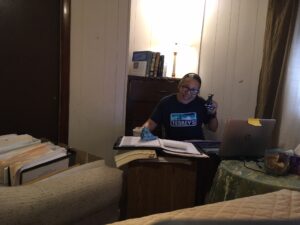
Debra Powell, Ph.D., associate professor of equine studies, like other faculty, had to pivot quickly to an online only format for her students when the College announced on March 18 that it would move all courses for the remainder of the semester in an effort to quell the spread of COVID-19. Therefore, she had to convert courses such as equine genetics, applied equine feeding, functional anatomy and physiology of the horse and animal nutrition to an online format for the first time in her teaching career.
Powell said she keeps in contact with all of her students personally via email, text, instant messaging and personal phone calls. “During these different times, they need to know I am right there on the front line with them and I understand the stress and strain this change can pose.”
Having offered an online major for many years, faculty in the education department shifted their courses with ease, according to education department chair and associate professor of education, Wendy Walter, Ph.D.
“We have a technology thread through our programs to meet national accreditation, so our students were already adept at video assignments, virtual classrooms and technology applications,” Walter said. “I’m holding more discussions and virtual class meetings so students can see each other along with me and doing regular email check-ins and phone calls so they don’t feel alone. I already did these things with online students, so it wasn’t difficult to make the shift.”
For Rebecca Andrews, MFA, art and design department chair and professor of graphic design, the biggest challenge was converting drawing, painting and 3D foundations classes.
“Our faculty have each taught distance at one time or another, so we were familiar with the process. Besides adjusting some due dates and doing audio slide show lectures and demos, it really has not changed the plan for my courses,” Andrews noted.

Andrews said her students have transitioned well and they know they are making these adjustments together.
“Whenever I talk to my students, they all indicate that they are doing well, but miss seeing their peers and faculty. Students should know that the faculty are here to help them,” Andrews said.
Putting students first is what the Woods does best, said Clark.
“Faculty tell me that when they take a few minutes to ask our students how they are doing, they can see them visibly relax and feel more comfortable,” said Clark. “This is part of our community and the character and culture of The Woods – it’s what we have always done.”
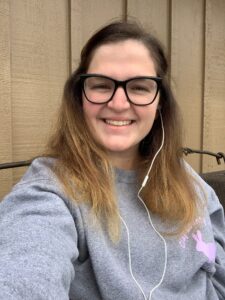
Senior Mannah Mace, a business administration major from Brazil, Indiana, and president of the senior class said her faculty have been amazing during this unprecedented learning time.
“All my professors have checked in on me and my classmates making sure that we have everything we need. They have shared personal phone numbers so we can call and talk about issues we are having in classes or just in our lives,” Mace said. “They have truly made a huge impact making the transition to online classes bearable, and still being there in person via video or phone whenever we need them.”
For Mace, technology, which she admits normally makes everyday life easier, is throwing her for a bit of a learning curve as she transitions from in-person classes to all online.
“I am handling it as well as one can whenever your whole house is working from home and using the WiFi all day,” Mace commented. “The thing I enjoy most are my video classes so I can still stay in touch with my professors and classmates.”
King noted that SWMC has been delivering remote education centered around meeting the students’ learning needs for so long that it has become part of the institution’s muscle memory. “Technology evolves and we change with it, but our student-centric focus is just part of our DNA,” said King.

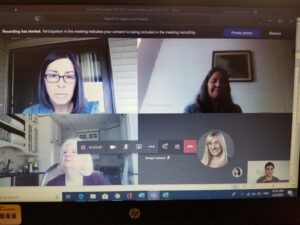
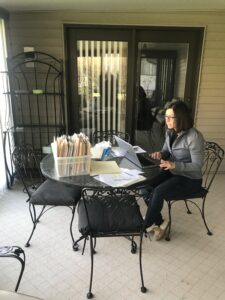
0 Comments